
Andrews UniuersilySeminay Studies, Vol. 45, No. 1, 87-100. CopyrightO


Andrews UniuersilySeminay Studies, Vol. 45, No. 1, 87-100. CopyrightO
Postmodernity brought about the greatest paradigm shift in philosophical stules since Socrates, Plato, and Aristotle defmed the basic structure and destiny of Western philosophy and science. In postmodern times, knowledge and truth have become relative to the historical and cultural conditions of the cognitive subject. Postmodern "herrneneutical reason"' replaces the "epistemologcal foundationabsm" of classical and modem times.2 The epistemologcal shift implies that truth changes with the times. We can no longer speak of "eternal" or "absolute" truth. Truth is relative to our historically and culturally conditioned lives3
How should evangelical theology relate to this epoch-making epistemological shift? Can we speak in postmodern times of an absolute unchanging theological truth?4 Recently, Stanley Grenz has addressed hs issue,5 proposing that evangelical theology should embrace postmodern epistemology andwork fromwihthe sociohstoricallimitations ofthechurch community and the culturally conditioned language of its tradition. In short, they see theology exploring "the world-constructing, knowledge-forming 'language' of the Christian
In this presentation, I will attempt to outline an alternate way to affirm both the paradgrnatic shift of postmodern epistemology and the absolute truth of Christian theology. I will argue,with Grenz, that evangelical theology
'Richard Rorty, Phibsophy and the Mirror $Nature, 22 ed. (Princeton: Princeton University Press, 19791,315-356.
'Ibid.
'Hans-Georg Gadamer, TruthandAiethod,trans.Joel Weinsheimerand Donald G. Marshall,2d rev. ed. (NewYork: Continuum, 1989).
4Foran introduction to the varioussensesin which the word "absolute" has been used in the history of philosophy,see, e.g.,JosC Ferrater Mora, DiccionariodeFiLosophif, 5th ed. (Buenos Aires: EditorialSudarnericana, 1965),s.v.,"absoluto." In this article, I use the word "absolute" to describetheological truth asnonrelativeor not conditioned to human-historicalflux.
'Stanley Grenz and John R. Franke, Bgond Foundationa/ism:Shaping Theology in a PostmodemContext(Louisville:WestminsterJohn Knox,2001).Grenz hasbeenespecially activein developingthe ideas foundin thisbook, aswell asin his otherprolificwritings. Therefore, the emphasiswill be on Grenz in this article,rather than Franke. 61bid.,53.
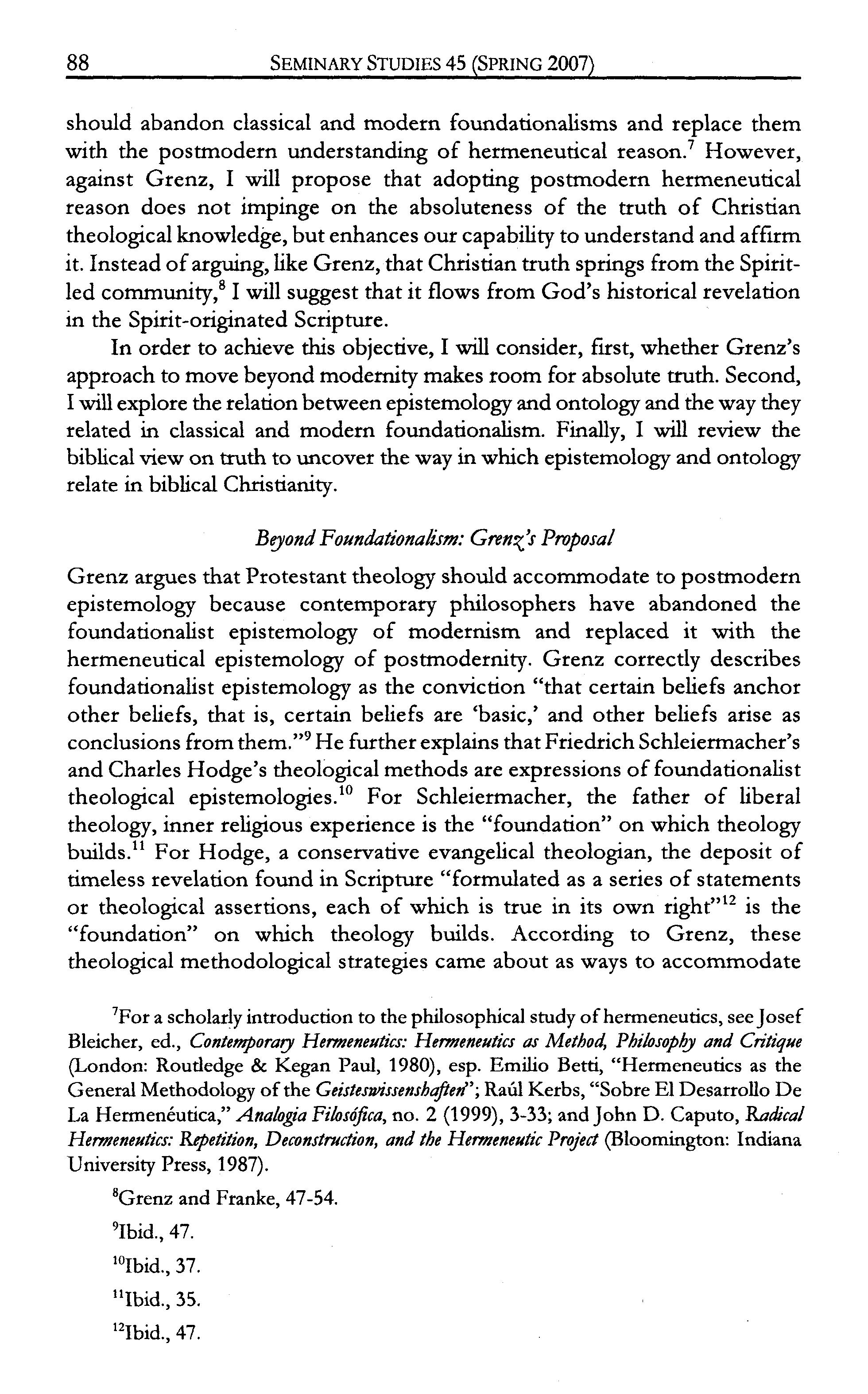
should abandon classical and modern foundationalisms and replace them with the postmodern understanding of hermeneutical reason.' However, against Grenz, I will propose that adopting postrnodern hermeneutical reason does not impinge on the absoluteness of the truth of Christian theologicalknowledge, but enhances our capabilityto understand and affirm it. Instead of arguing,like Grenz,that Christiantruth springs from the Spiritled community,' I will suggest that it flows from God's historical revelation in the Spirit-origmatedScripture.
In order to achieve this objective, I d consider, fust, whether Grenz's approachto move beyond modernity makes room for absolute truth. Second, Iwill exploretherelationbetween epistemologyand ontologyand the way they related in classical and modern foundationahsm. Finally, I will review the biblicalview on truth to uncover the way in which epistemologyand ontology relate in biblical Christianity.
Grenz arguesthat Protestant theology should accommodate to postrnodern epistemology because contemporary philosophers have abandoned the foundationalist epistemology of modernism and replaced it with the hermeneutical epistemology of postrnodernity. Grenz correctly describes foundationalist epistemology as the conviction "that certain beliefs anchor other beliefs, that is, certain beliefs are 'basic,' and other beliefs arise as conclusionsfromthem."9He further explainsthat FriedrichSchleiermacher's and CharlesHodgeYstheological methods are expressions of foundationalist theological episternol~ges.~~ For Schleiermacher, the father of liberal theology,inner religrous experience is the "foundation" on which theology builds." For Hodge, a conservative evangelical theologian, the deposit of timeless revelation found in Scripture "formulated as a series of statements or theological assertions, each of whch is true in its own rightnt2is the "foundation" on which theology builds. Accorcfing to Grenz, these theological methodological strategies came about as ways to accommodate
'For ascholarlyintroductionto thephilosophical studyof hermeneutics,seeJosef Bleicher, ed., Conteqboray Hermeneutics:Hermeneutics as Method, Phibsoply and Critique (London: Routledge & Kegan Paul, 1980), esp. Emilio Betti, "Hermeneutics as the GeneralMethodologyof the Geis~eswissensha$?en'~;Raa Kerbs,"Sobre ElDesarrolloDe La Hermeniutica,"Analogia Fiho~ca7no. 2 (1999)' 3-33; andJohn D. Caputo,Radcal Hermenetltics: Qetition, Deconstmction, and the HermeneuticProject (Bloomington:Indiana University Press, 1987).
'Grenz and Franke, 47-54.
bid., 47.
"Ibid., 37.
"Ibid., 35.
121bid.,47.
evangelical theology to a "strong" philosophical foundationalism that gave priority to scientificnatural statements over religious ones.l3
Grenz correctly perceives that postmodernity undermined the claim of strong Enlightenment foundationalism. Additionally, he believes that evangelicaltheologywouldgreatlybenefit from accommodatingits theological method and systematic theology to the new friendlierpatterns of postmodem epistemology. Thus, according to him, evangelical method and systematic theology should adjust to the new postmodern "communitarian turn."14 Thinlungfrom within the modernist tradition, whose epistemologyhe rejects, Grenz conceives that the task of theology springs not from divine revelation, but from religious experience. However, he attempts to distance his theology from the modern model by explainingthat religious experiences are not bare spiritual events, but take place within a specific"interpretive framework-a grid-that facihtates their occ~rrence."'~Adopting the postrnodern cornrnunitarian turn,16 Grenz conceives that concrete religious traditions provide the interpretative frameworks from which Christian experience and theology flow.I7
Yet, if Christian theology is bound to the changing flow of tradtion's interpretiveframeworks,in what sense canwe say that the theologcalvision of various Christian communities is true?18Grenz's theologcal proposal implies theological relativism. He recognizes that although theological constructions imply the claim to “validity," we cannot confirm their truth by means of a "a universally accessible present reality."19 To "solve" the historical relativism embedded in his theologicalproposal, Grenz adopts Pannenberg's well-known "eschatological" strategy.Onlythe eschatologicaladventof Godwill conhthe transcendent theological vision generated by religious communities. Grenz's theologcal proposal leaves the question of present truth danglq in the uncertainty of cultural relativism, leaving no room for the absolute truth of Christianity.
Arewe rationallybound to wait in our concrete communities of faith for
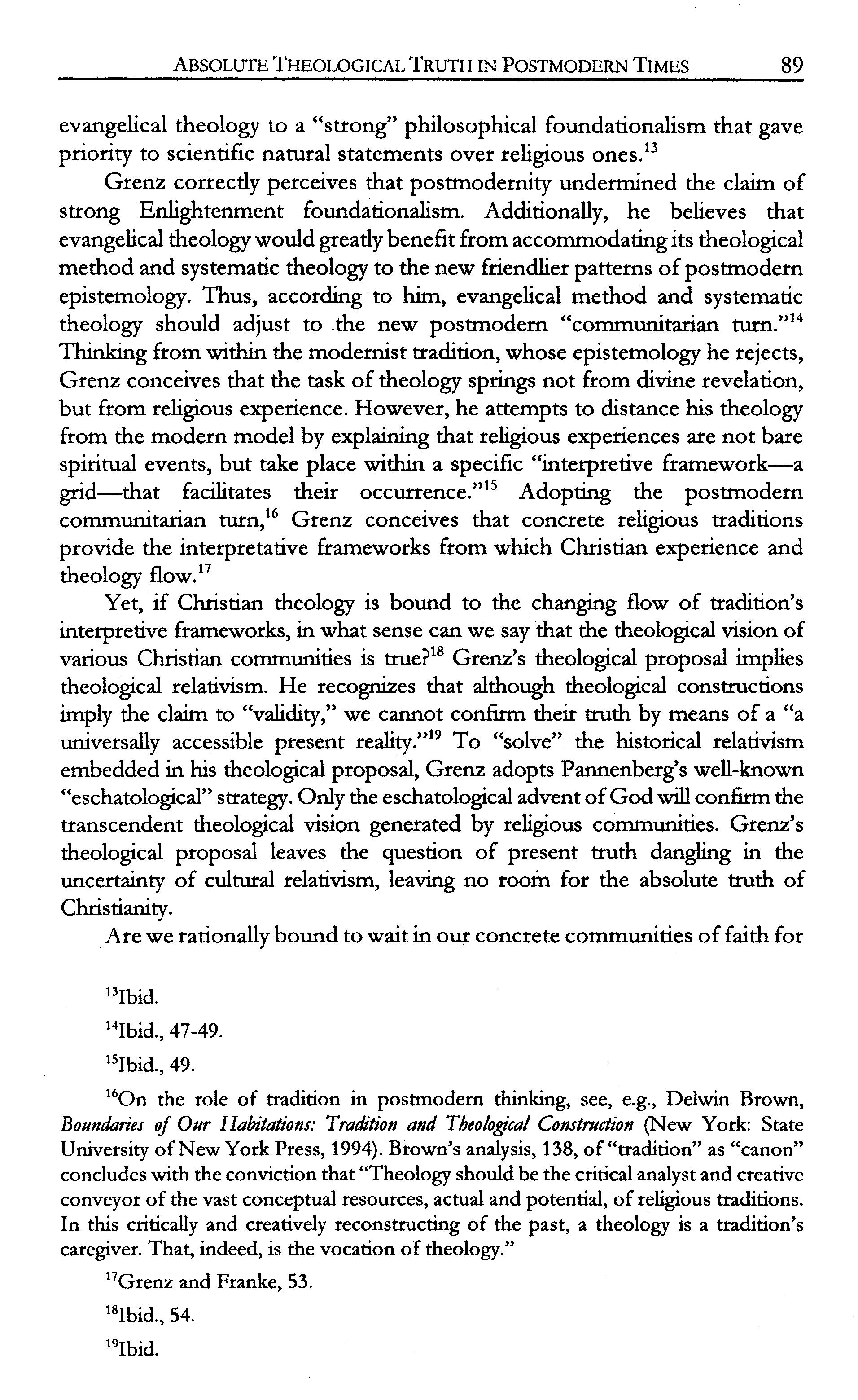
I60n the role of tradition in postmodern thinking, see, e.g., Delwin Brown, Boundan'es of Our Habitati0n.r: Tradtion and TheotogicaL Constmction (New York: State Universityof New York Press, 1994).Brown's analysis,138,of "tradition" as "canon" concludeswith the convictionthat"Theology shouldbe the criticalanalystand creative conveyorof the vast conceptualresources,actual and potential, of rebous traditions. In this critically and creatively reconstructing of the past, a theology is a tradition's caregiver.That, indeed,is the vocationof theology."
I7Grenzand Franke,53.
I8Ibid.,54.
lgIbid.

the eschatologcal confumation of the absolute truth of Christian communities?Does the acceptanceofhermeneuticalreason unavoidablylead to theological relativism? Can evangelical theology adopt postmodern hermeneutical reason and still affirm the absoluteness of Christian truth?
To assess the compatibility of postmodern hermeneutical reason with the absolute truth of Christianity,we need, first, to consider the nature of truth. Contrary to general opinion, the nature of truth belongs not only to epistemology,but also to ontology.The modem turn to the subjecthas led us to neglect the ontologicalground of truth. For more than three centuries,we have becomeaccustomedto thinkingof truth as the outcome of human reason and language. We think of truth in epistemological categories. The antimetaphysical leanings of empiricism, medated through analytical philosophy and the phdosophy of language, have led many evangelical theologians to neglect the ontologcal ground of reason. Modernity forgot Parinenides's groundbreakinginsight:"Beingand thinkingbelong together."20 According to this principle, knowledge, the words we use to communicate knowledge, and the truth of our words directlyrelate to the way in which we understand reality. Epistemologystands on ontologcalgrounds. If this is true, the modem turn to the subject prevented modernity from properly assessing the nature of truth and the relation of scientificknowledge to truth.
The truth of statementsstands on the nature of the reality to which they refer.21According to classical ontology, absolute truth refers to timeless, changelessrealities.Accordingtomodern empiricistantimetaphysicalontology, relative truth refers to temporal, changing realities. However, the classical convictionthat reason is abletoproduce absoluteknowledgecontinuedduring the Englightenment because old habits of thought die hard. Kant's transcendental turn to the subject argued that the absoluteness of scientific truth stood not onontologicalbut epistemologicalgrounds.In otherwords,the absoluteness and changelessnessof scientifictruth was the product of human reason." In the twentieth century, scientific methodology replaced Kantian transcendentalism as the origin and foundation of absolute truth.23
20Parmenidesstated that "It is the same thing to think and to be" ("The Way to Truth," inAnn'IbtothePre-SomaticPbihsopbers:A CoqhteTrmkdonofbeFragmentsinDieLF, Frapenteder Vor~okratiker,ed.Kathleen Freeman [Oxford:Blackwell,19481,frag.3).
21MartinHeidegger argues that "to say that an assertion 'is true' signifies that it uncovers the entity as itisin itself.Such an assertionasserts,pointsout,lets' the entity 'beseen' (apo+ban.cis)in itsuncoveredness.TheBeing-tme(truth)of theassertionmustbe understood as Being uncoverinf (Being and Time, trans. John Macquarrie and Edward Robinson pew York: Harper and Collins, 19621,1.6.44.a[p. 2611,emphasisoriginal).
221mmanuelKant, Critique of Pure Reason, trans. J. M. D. Meiklejohn (Buffalo: Prometheus, 1990).
'That science produces absolutetruth is a myth. Scientificmethodology cannot
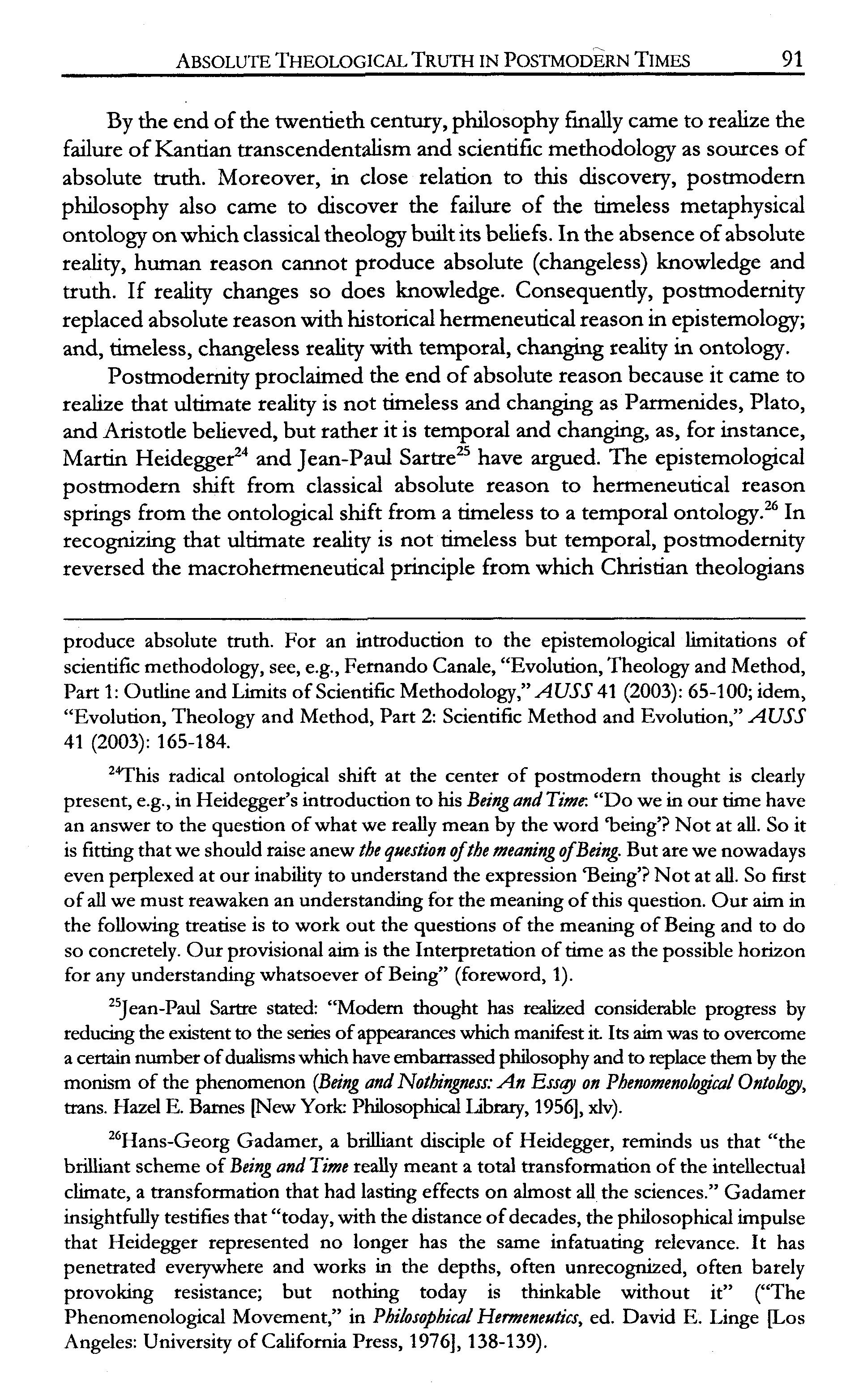
By the end of the twentieth century, philosophy finally came to realize the failure of Kantian transcendentalism and scientific methodology as sources of absolute truth. Moreover, in close relation to this discovery, postmodern phdosophy also came to discover the failure of the timeless metaphysical ontology onwhich classicaltheology built itsbeliefs. In the absence of absolute reality, human reason cannot produce absolute (changeless) knowledge and truth. If reality changes so does knowledge. Consequently, postmodernity replaced absolute reason with historical hermeneutical reason in epistemology; and, timeless, changeless reality with temporal, changing reality in ontology. Postmodernity proclaimed the end of absolute reason because it came to realize that ultimate reality is not timeless and changing as Parrnenides, Plato, and Aristotle believed, but rather it is temporal and changmg, as, for instance, Martin Heideggelz4 and Jean-Paul SartreZ5have argued. The epistemological postmodern shift from classical absolute reason to hermeneutical reason springs from the ontological shift from a timeless to a temporal ontology.26In recognizing that ultimate reahty is not timeless but temporal, postmodernity reversed the macrohermeneutical principle from which Christian theologiansproduce absolute truth. For an introduction to the epistemological limitations of scientificmethodology,see,e.g., Fernando Canale,"Evolution, Theologyand Method, Part 1:Outline and Limits of ScientificMethodology," AUSS 41 (2003):65-100;idem, "Evolution, Theology and Method, Part 2: ScientificMethod and Evolution," AUSS 41 (2003): 165-184.
This radical ontological shift at the center of postmodern thought is clearly present, e.g.,in Heidegger's introduction to his Beingand Time:"Do we in our time have an answer to the question of what we really mean by the word 'being'? Not at all. So it is fittingthat we shouldraiseanewthequestionofthe meaningofBeing. But arewe nowadays even perplexedat our inability to understand the expression'Being'?Not at all. So first of all we must reawaken an understanding for the meaningof this question.Our aim in the following treatise is to work out the questions of the meaning of Being and to do so concretely. Our provisional aimis the Interpretation of time as the possiblehorizon for any understandingwhatsoever of Being" (foreword, 1).
'5Jean-Paul Same stated: "Modern thought has realized considerable progress by reducingthe existentto the seriesof appearanceswhich manifestit Itsaimwasto overcome acertainnumberofdualismswhich haveembarrassedphilosophyandtoreplacethem by the monism of the phenomenon (Being andNothingneess: An Essg on Phenomenobgi'cafOntobgy, trans.Hazel E. Barnes pew York: PhilosophicalLibrary, 19561,xlv).
"Hans-Georg Gadamer, a brilliant disciple of Heidegger, reminds us that "the brilliant scheme of BeingandTimereally meant a total transformation of the intellectual climate,a transformation that had lasting effects on almost all the sciences." Gadamer insightfullytestifiesthat "today, with the distanceof decades,the philosophicalimpulse that Heidegger represented no longer has the same infatuating relevance. It has penetrated everywhere and works in the depths, often unrecognized, often barely provoking resistance; but nothing today is thinkable without it" ("The Phenomenological Movement," in PhifosaphicalHemeneutics, ed. David E. Linge Fos Angeles:University of California Press, 19761, 138-139).
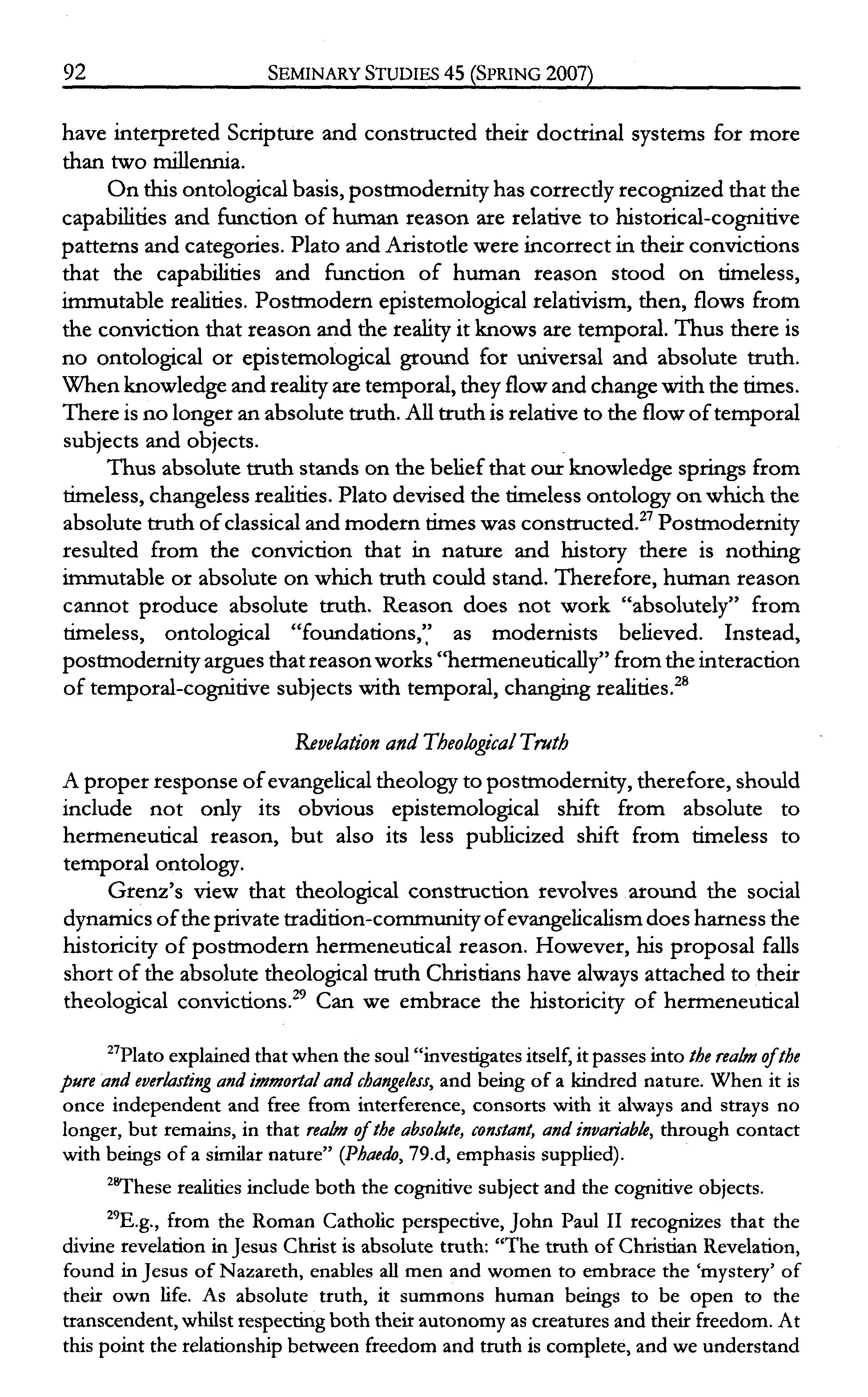
have interpreted Scripture and constructed their doctrinal systems for more than two millennia.
On thisontologicalbasis,postmodernityhas correctlyrecognized that the capabditiesand function of human reason are relative to historical-cognitive patterns and categories.Plato andAristotlewere incorrectin theirconvictions that the capabilities and function of human reason stood on timeless, immutable realities. Postmodern epistemologicalrelativism,then, flows from the convictionthat reason and the realityit knows are temporal.Thus there is no ontological or epistemological ground for universal and absolute truth. Whenknowledge andrealityaretemporal,theyflowandchangewiththetimes. Thereisno longeranabsolutetruth.All truthisrelative to the flowof temporal subjects and objects.
Thus absolute tmth standson the belief that our knowledgesprings from timeless, changelessrealities. Plato devisedthe timeless ontologyonwhch the absolutetruth of classicalandmodern timeswas constructed." Postmodernity resulted from the conviction that in nature and hlstory there is nothing immutable or absolute on which truth could stand.Therefore, human reason cannot produce absolute truth. Reason does not work "absolutely" from timeless, ontological "foundations,',' as modernists believed. Instead, postmodernityarguesthatreasonworks"hermeneutically"fromtheinteraction of temporal-cognitivesubjectswith temporal, changingrealities.28
A proper responseof evangelicaltheology topostrnodernity,therefore,should include not only its obvious epistemological shift from absolute to hermeneutical reason, but also its less publicized shift from timeless to temporal ontology.
Grenz's view that theological construction revolves around the social dynamicsoftheprivatetradition-communityofevangelicalismdoesharnessthe historicity of postmodern hermeneutical reason. However, his proposal falls short of the absolute theologcal truth Christianshave always attachedto their theological conviction^.^ Can we embrace the hstoricity of hermeneutical
"Plato explainedthat when the soul"investrgatesitself,itpassesinto the reah oftbe pure and everluting andimmortalandchangeless,and being of a kindred nature. When it is once independent and free from interference, consorts with it always and strays no longer, but remains,in that reah of the absolute, constant, andinvariabh, through contact with beings of a similarnature" (Phaedo,79.d' emphasissupplied).
28Theserealitiesincludeboth the cognitive subjectand the cognitive objects.
29E.g.,from the Roman Catholic perspective,John Paul I1 recognizes that the divine revelationinJesus Christ is absolute truth: "The truth of Christian Revelation, found in Jesus of Nazareth, enables all men and women to embrace the 'mystery' of their own life. As absolute truth, it summons human beings to be open to the transcendent,whilst respectingboth their autonomy as creaturesand their freedom.At this point the relationshipbetween freedom and truth is complete,and we understand
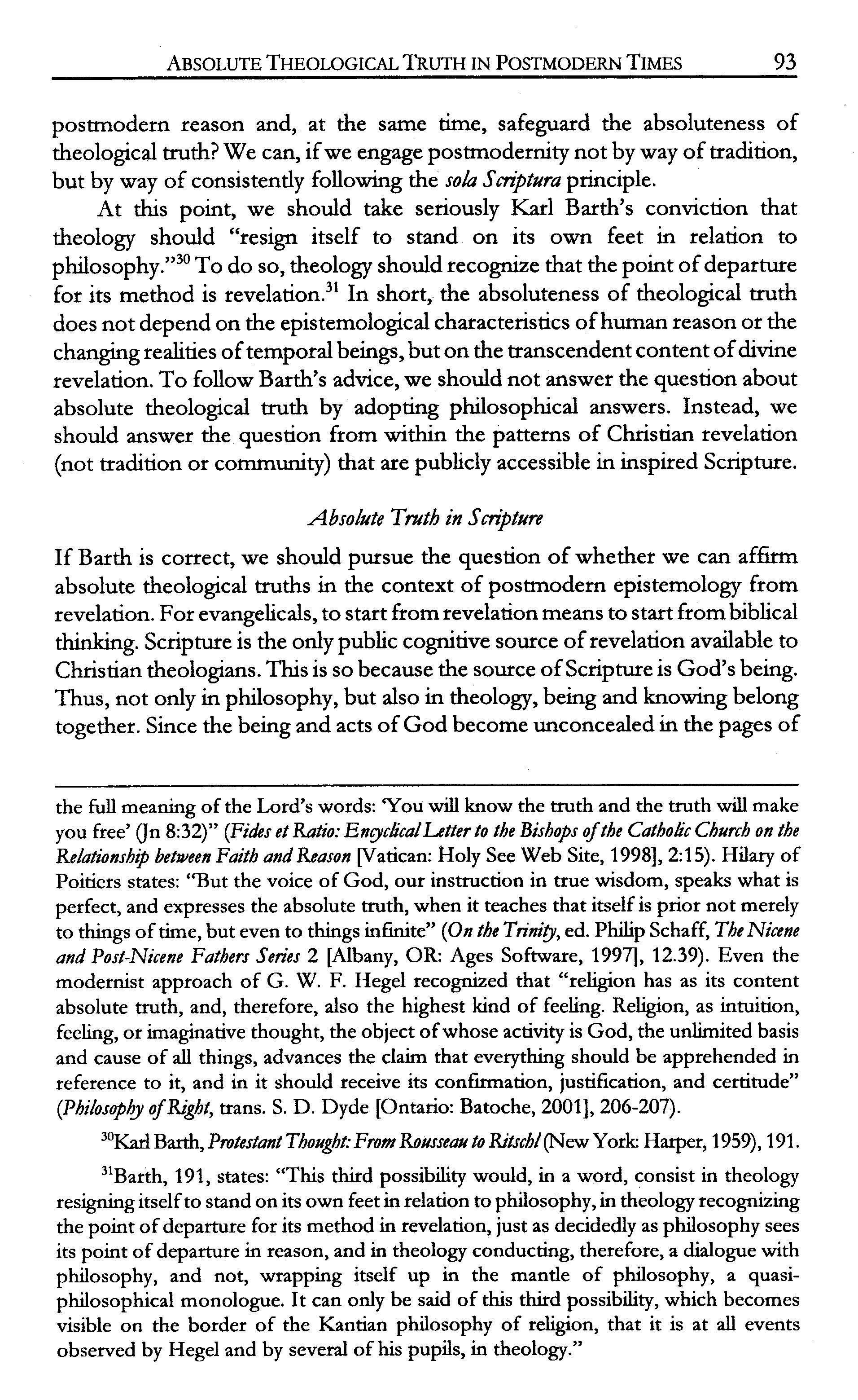
postmodern reason and, at the same time, safeguard the absoluteness of theologicaltruth?We can,if we engagepostmodernitynot byway of tradtion, but by way of consistently followingthe sob Scriptma principle.
At thts point, we should take seriously Karl Barth's conviction that theology should "resign itself to stand on its own feet in relation to philosophy."30Todo so,theologyshouldrecognizethat thepoint of departure for its method is re~elation.~'In short, the absoluteness of theological truth doesnot dependonthe epistemologicalcharacteristicsofhuman reasonorthe changingrealitiesof temporalbeings,but onthetranscendentcontent of&vine revelation.To followBarth's advice,we shouldnot answerthe questionabout absolute theological truth by adopting philosophical answers. Instead, we should answer the question from within the patterns of Christian revelation (not tradtion or community)that are publicly accessible in inspired Scripture.
If Barth is correct,we should pursue the question of whether we can afh absolute theologd truths in the context of postmodern epistemology from revelation.Forevangelicals,tostartfromrevelationmeanstostartfrombiblical thinking. Scriptureis the onlypubliccognitivesourceof revelation availableto Christiantheologians.Thisissobecausethe sourceof ScriptureisGod's being. Thus, not onlyin philosophy, but also in theology, being and knowingbelong together.Since the being and actsof God become unconcealed in the pages of
the full meaningof the Lord's words: You willknow the truth and the truth willmake you free' (Jn8:32)" (Fideset Ratio:Enyckcalhtter to the Bishop ofthe CafhokChurchon the Rehionship betweenFaith and Reason [Vatican: Holy SeeWeb Site, 19981,215). Hilary of Poitiers states: "But the voice of God, our instruction in true wisdom, speakswhat is perfect, and expresses the absolute truth, when it teaches that itself is prior not merely to thingsof time,but even to thingsinfinite" (Onthe Trinity,ed.Philip Schaff, TheNicene and Post-Nicene Fathers Series 2 [Albany, OR: Ages Software, 19971, 12.39). Even the modernist approach of G. W. F. Hegel recognized that "religion has as its content absolute truth, and, therefore, also the highest kind of feeling. Reltgion, as intuition, feeling,or imaginativethought, the object ofwhose activityis God, the unlimited basis and cause of all things, advancesthe claim that everything should be apprehended in reference to it, and in it should receive its confirmation, justification, and certitude" (PhilosophyofRrght,trans. S.D. Dyde [Ontario:Batoche,20011,206-207).
SoKarlBarth,Protestant Thought:Fw RotlsseautoRitschl (NewYork Harper,1959),191.
31Barth,191,states: "This third possibilitywould, in a word, consist in theology resigningitselfto standonitsown feetinrelationtophilosophy,intheologyrecognizing the point of departure for its method in revelation, just as decidedlyas philosophy sees its point of departure in reason,and in theology conducting, therefore,a dialoguewith philosophy, and not, wrapping itself up in the mantle of philosophy, a quasiphilosophical monologue. It can only be said of this third possibility,which becomes visible on the border of the Kantian philosophy of rebon, that it is at all events observed by Hegel and by several of his pupils, in theology."
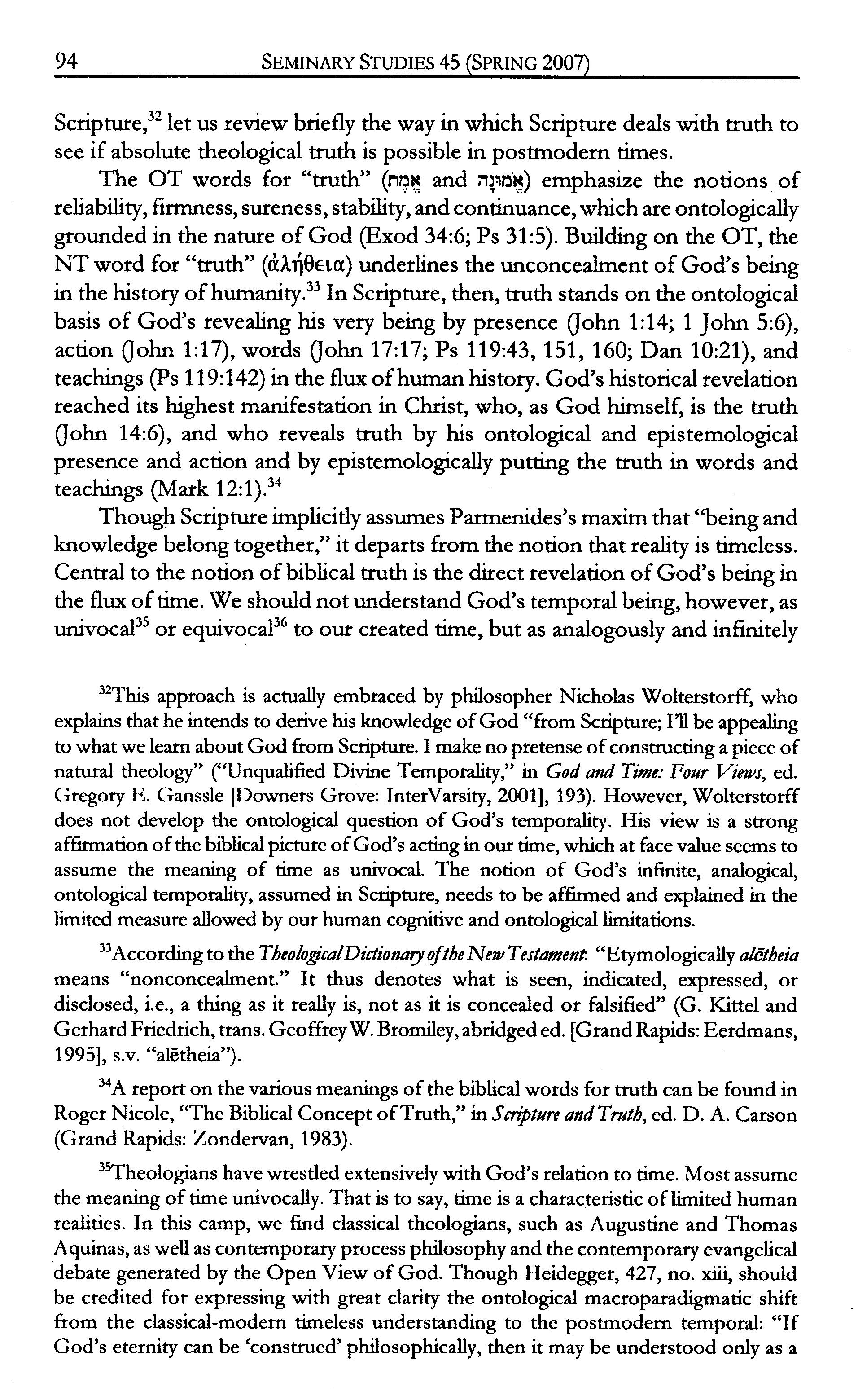
S~ripture:~let us review briefly the way in which Scripturedealswith truth to seeif absolute theologicaltruth is possible in postrnodern times.
The OT words for "truth" (nn~and npn8) emphasize the notions of reliability,firmness,sureness,stability,andcontinuance,whichareontologically grounded in the nature of God (Exod 34:6; Ps 315). Buildingon the OT, the NT word for "truth" (dlk$3~101)underlines the unconcealmentof God's being in the history of humanity.33In Scripture,then,truth standson the ontological basis of God's revealing his very being by presence (John 1:14; 1John 5:6), action (John 1:17), words (John 17:17; Ps 119:43, 151, 160; Dan 10:21), and teachings(Ps 119:142) in the fluxofhuman history.God's hstorical revelation reached its hghest manifestation in Christ, who, as God himself, is the truth (John 14:6), and who reveals truth by hls ontological and epistemological presence and action and by epistemologcallyputting the truth in words and teachings (Mark 12:
Though ScriptureimplicitlyassumesParrnenides's maximthat "being and knowledge belongtogether," it departs from the notion that realityis timeless. Central to the notion of biblicaltruth is the directrevelation of God's beingin the fluxof time.We shouldnot understandGod's temporalbeing,however,as univocal35or equivocal36to our created time, but as analogously and infinitely
"This approach is actually embraced by philosopher Nicholas Wolterstorff, who explainsthathe intendsto derivehis knowledgeof God "from Scripture;I'll be appealing towhatwelearn aboutGod from Scripture.I make no pretense of constructinga piece of natural theology" ("Unqualified Divine Temporality," in God and Time: Fow Views, ed. Gregory E. Ganssle [Downers Grove: InterVarsity,20011, 193). However, Wolterstorff does not develop the ontological question of God's temporality. His view is a strong affirmationof thebiblicalpictureof God's actinginour time,which at facevalue seemsto assume the meaning of time as univocal. The notion of God's infinite, analogical, ontologicaltemporality,assumedin Scripture,needs to be affirmed and explained in the limited measure allowedby our human cognitiveand ontologicallimitations.
"According tothe Theo/ogica/DictionayofheNewTestament "EtymologicallyafEtheia means "nonconcealment." It thus denotes what is seen, indicated, expressed, or disclosed,i.e., a thing as it really is, not as it is concealed or falsified" (G. Kittel and Gerhard Friedrich,trans.GeoffreyW.Bromiley,abridgeded. [GrandRapids:Eerdmans, 19951,s.v. ''aBtheiaV).
34Areport on the various meanings of the biblicalwords for truth can be found in Roger Nicole,"The Biblical Concept of Truth," in S+twe andTruth, ed. D. A. Carson (Grand Rapids: Zondervan, 1983).
'qheologians havewrestled extensivelywith God's relation to time. Most assume the meaningof time univocally.That is to say, time is a characteristicof limited human realities. In this camp, we find classical theologians, such as Augustine and Thomas Aquinas,aswellas contemporaryprocessphilosophyand the contemporaryevangelical debate generated by the Open View of God. Though Heidegger,427, no. xiii, should be credited for expressingwith great clarity the ontologicalmacroparadigmatic shift from the classical-modern timeless understanding to the postrnodern temporal: "If God's eternitycan be 'construed' philosophically, then it may be understood only as a
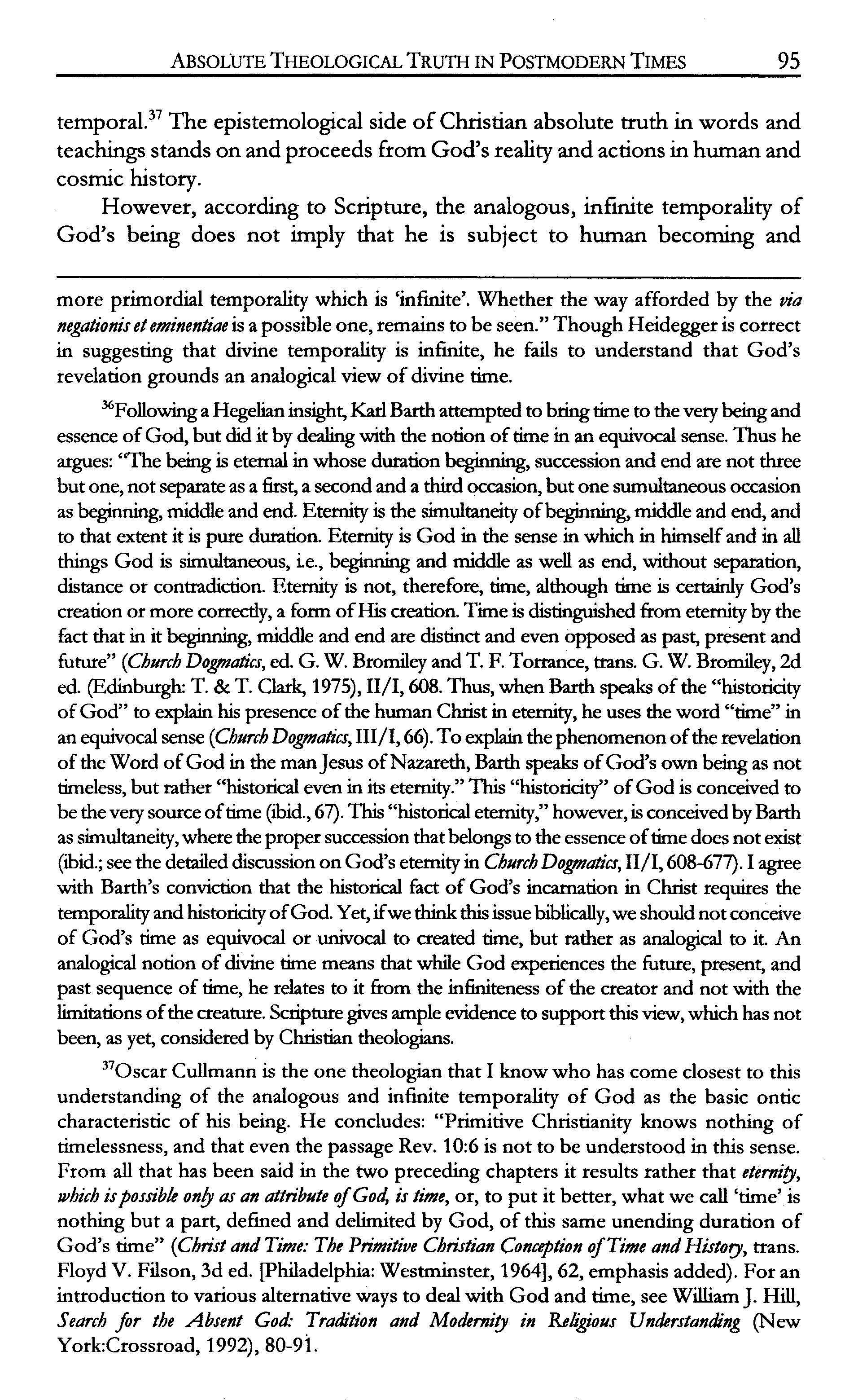
temp~ral.~'The epistemological side of Christian absolute truth in words and teachings stands on and proceeds from God's reality and actions in human and cosmic history.
However, according to Scripture, the analogous, infinite temporality of God's being does not imply that he is subject to human becoming and
more primordial temporality which is 'infinite'. Whether the way afforded by the via negationiseteminentiaeisapossible one,remainsto be seen." Though Heideggeris correct in suggesting that divine temporality is infinite, he fails to understand that God's revelation grounds an analogicalview of &vine time.
36FollowingaHegelianinsight,KarlBarthattemptedtobringtimetotheverybeingand essenceof God,but didit byddqwith thenotion of time in an equivocal sense.Thus he argues:'The beq is eternalin whose durationbeginning, successionand end are not three butone,not separateasa &st, asecondandathird occasion,but onesurnultaneousoccasion asbeg;mnmg,middleand end.Eternity is the simultaneityof begmmg, middleand end,and to that extentit is pure duration.Eternity is God in the sensein which in himself and in all things God is simultaneous,ie., begmmgand middle as well as end,without separation, distanceor contradiction. Eternity is not, therefore, time, although time is certainly God's creationor morecorrectly,a form of Hiscreation.Timeisdistinguishedfrom eternityby the fact that in it begmning, middleand end are distinctand even opposed as past, present and future" (ChurchDogmatics,ed.G.W. BromileyandT. F.Torrance,trans.G.W. Bromiley,2d ed. (Edinburgh:T. &T. Clark, 1975),II/I, 608.Thus,whenBarth speaksof the "historicity of God" to explainhis presenceof the human Christin eternity,he uses the word "timeyyin anequivocalsense(ChurchDogmatics,III/I, 66).Toexplainthephenomenonoftherevelation of theWord of God in themanJesusof Nazareth, Barth speaksof God's own beingasnot timeless,but rather "historical evenin its eternity." This"historicityyyof God is conceivedto betheverysourceoftime (ibid.,67).This"historical eternity," however,isconceivedbyBarth assimultaneity,wheretheproper successionthatbelongstotheessenceoftimedoesnotexist (ibid.;seethedetaileddiscussiononGod'seternityin ChurchDogmatics,II/I, 608-677).Iagree with Barth's conviction that the historical fact of God's incarnation in Christ requires the temporalityandhistoricityofGod.Yet,ifwethink thisissuebiblically,we shouldnotconceive of God's time as equivocal or univocal to created time, but rather as analogical to it An analogicalnotion of divine time means that while God experiencesthe future, present, and past sequenceof time, he relates to it from the infinitenessof the creatorand not with the limitationsofthecreature.Scripturegivesampleevidencetosupportthisview,which hasnot been, as yet,consideredby Christian theologians.
370scarCullrnann is the one theologian that I knowwho has come closestto this understanding of the analogous and infinite temporality of God as the basic ontic characteristic of his being. He concludes: "Primitive Christianity knows nothing of timelessness,and that even the passage Rev. 10:6is not to be understood in this sense. From all that has been said in the two preceding chapters it results rather that eternity, which ispossib/e on4 as an attn'buteofGod,istime, or, to put it better, what we call 'time' is nothing but a part, defined and delimited by God, of this same unending duration of God's time" (Christ andTime: The Pn'mitiveChn'stian ConctptionofTimeandHistoty, trans. Floyd V. Filson,3d ed. [Philadelphia:Westminster, 1964],62,emphasisadded). For an introduction to various alternativeways to dealwith God and time, see WilliamJ. Hill, Search for the Absent God Tradition and Modernity in Reb@ous Understandng (New YorkCrossroad, 1992),80-91.
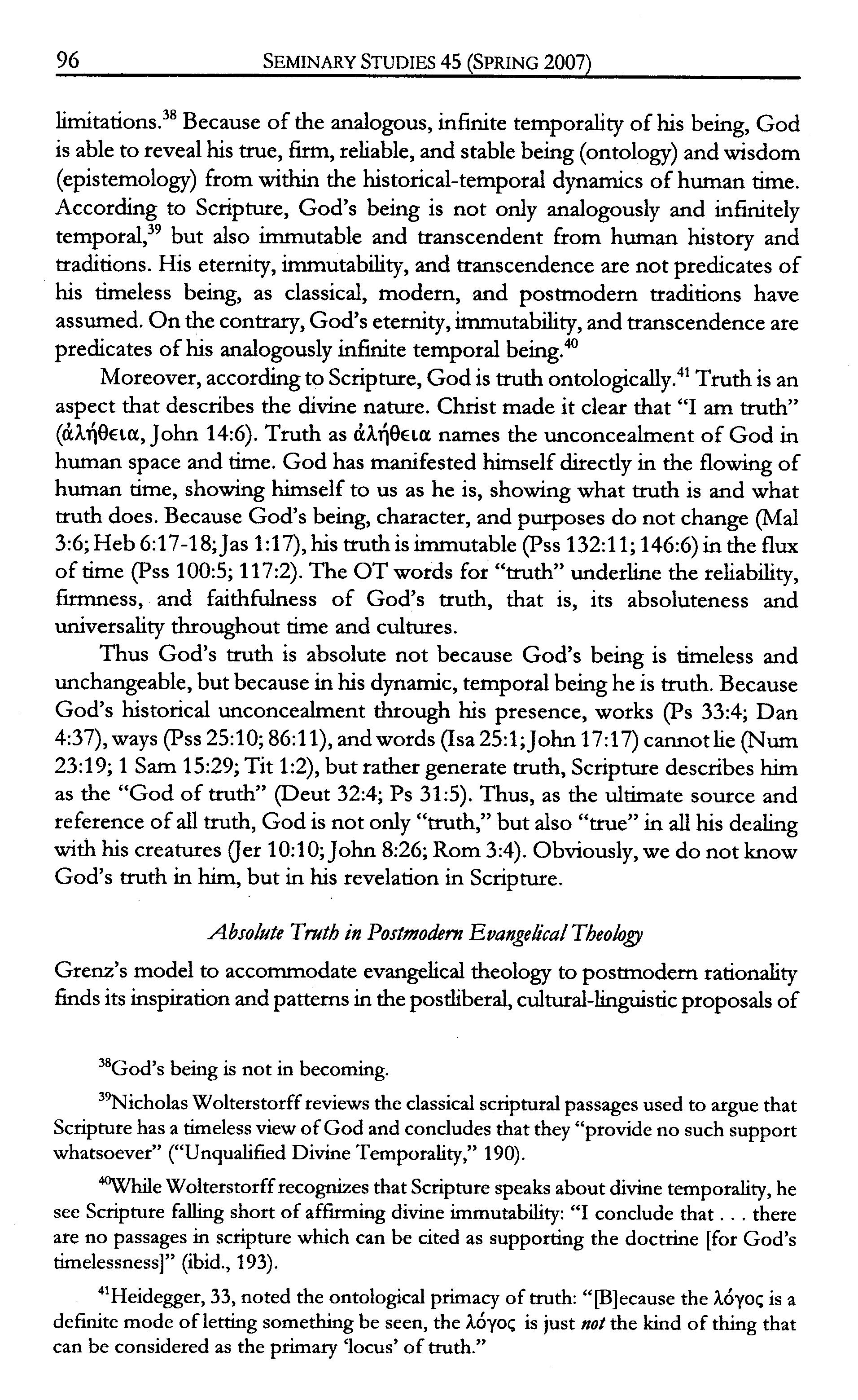
lim~tations.'~Because of the analogous,infinite temporality of his being, God is able to revealhis true, firm,reliable, and stablebeing (ontology) andwisdom (epistemology) from within the historical-temporal dynamicsof human time. According to Scripture, God's being is not only analogously and infinitely temporal:9 but also immutable and transcendent from human history and traditions.His eternity,immutability,and transcendenceare not predicatesof his timeless being, as classical, modern, and postmodern traditions have assumed.Onthecontrary,God's eternity,immutability,andtranscendenceare predicates of hs analogouslyinfinite temporal being.40
Moreover,accordingto Scripture,Godis truth ont~lo~icall~.~' Truth is an aspect that describes the divine nature. Christ made it clear that "I am truth" (drhtje~ia,John 14:6).Truth as khtje~ianames the unconcealment of God in human space and time. God has manifested himself du-ectlyin the flowingof human time, showinghimself to us as he is, showingwhat truth is and what truth does.Because God's being, character, and purposes do not change (Mal 3:6;Heb6:17-l8;Jas l:l7),his truth isimmutable (Pss l32:ll; 146:6)in the flux of time (Pss 100:5;1l7:2).The OT words for "truth" underline the reliabhty, firmness, and faithfulness of God's truth, that is, its absoluteness and universahty throughout time and cultures.
Thus God's truth is absolute not because God's being is timeless and unchangeable,but becausein his dynamic, temporalbeinghe is truth. Because God's historical unconcealment through his presence, works (Ps 33:4; Dan 4:37),ways (Pss25:10;86:lI),andwords (IsaEl;John 17:17)cannotlie (Nurn 23:19; 1Sam 15:29;Tit 1:2),but rather generatetruth, Scripture describes him as the "God of truth" (Deut 32:4;Ps 31:5). Thus, as the ultimate source and referenceof all truth, God is not only "truth," but also "true" in all his dealing with his creatures(Jer10:10;John 8:26; Rom 3:4). Obviously,we donot know God's truth in h, but in his revelationin Scripture.
Grenz's model to accommodateevangelicaltheology to postmodern rationality fkdsitsinspirationandpatternsinthepostliberal,cultural-hguisticproposalsof
38God'sbeingis not in becoming.
39NicholasWolterstorffreviewsthe classicalscripturalpassagesused to arguethat ScripturehasatimelessviewofGod andconcludesthatthey"provideno such support whatsoever"("UnqualifiedDivineTemporality,"190).
WhdeWolterstorffrecognizesthatScripturespeaksaboutdivinetemporality,he see Scripture falling short of affirmingdivine immutability:"I conclude that . ..there are no passagesin scripturewhich can be cited as supporting the doctrine [forGod's timelessness]" (ibid.,193).
41Heidegger,33,noted the ontologicalprimacy of truth:"[Blecausethe &oC is a definite mode ofletting somethingbe seen,the k6yo~is just not the kind of thing that can be considered as the primary 'locus' of truth."
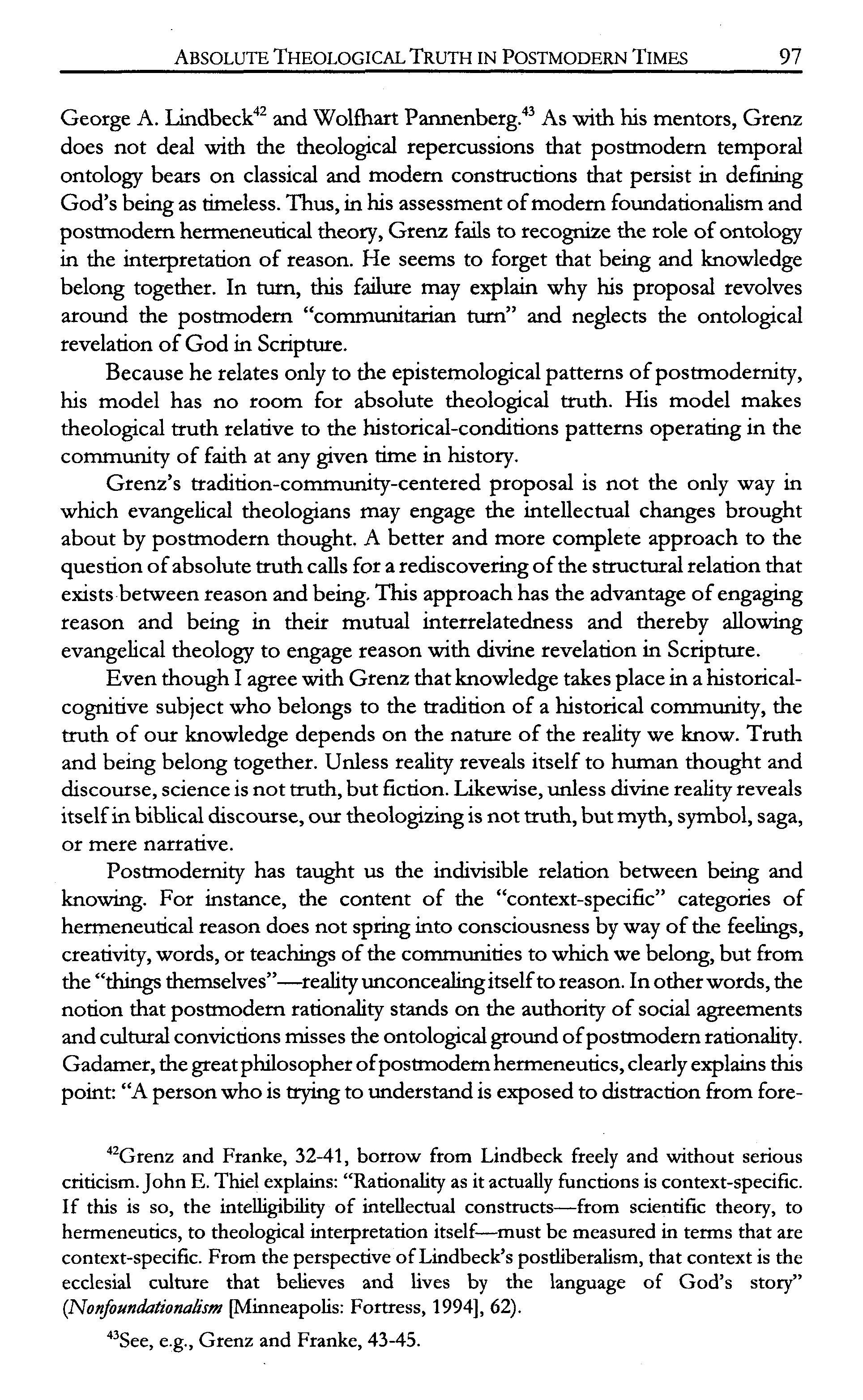
George A. L~ndbeck~~ and Wolfiart Pa~~nenber~?~ As with his mentors, Grenz does not deal with the theological repercussions that postmodern temporal ontology bears on classical and modem constructions that persist in defimg God's beingas timeless.Thus,in his assessmentof modem foundationalrsmand postmodernhermeneutical theory, Grenz fails to recognize the role of ontology in the interpretation of reason. He seems to forget that being and knowledge belong together. In turn, this farlure may explain why his proposal revolves around the postmodern "cornunitarian turn" and neglects the ontological revelation of God in Scripture.
Because he relates only to the epistemologicalpatterns of postmodernity, hs model has no room for absolute theological truth. His model makes theologicaltruth relative to the hstorical-conditions patterns operatingin the community of faith at any gwen time in history.
Grenz's tradition-community-centered proposal is not the only way in whch evangelical theologians may engage the intellectual changes brought about by postmodern thought. A better and more complete approach to the questionof absolutetruth calls for arediscoveringof the structuralrelation that exists between reason and being,This approachhas the advantageof engagmg reason and being in their mutual interrelatedness and thereby allowing evangelicaltheology to engage reason with &vine revelation in Scripture.
Even thoughI agreewith Grenz thatknowledge takesplacein ahistoricalcogrutive subject who belongs to the tradtion of a historical community, the truth of our knowledge depends on the nature of the reality we know. Truth and being belong together.Unless realrty reveals itself to human thought and drscourse,scienceisnot truth,but fiction.Likewise,unlessdivinerealityreveals itself inbiblicaldiscourse,our theologizingisnot truth, but myth,symbol,saga, or mere narrative.
Postmodernity has taught us the indivisible relation between being and knowing. For instance, the content of the "context-specific" categories of henneneuticalreason does not springinto consciousness by way of the feelings, creativity,words,or teachings of the communities to whichwe belong, but from the"things themselves"-reality unconceahgitself toreason.Inotherwords,the notion that postmodernrationalitystands on the authorityof social agreements andculturalconvictionsmisses the ontologicalgroundofpostmodern rationality. Gadarner,thegreatphdosopherofpostmodemhermeneutics,clearlyexplainshs point:"Aperson whois tryingto understandis exposed to distractionfromfore-
42Grenzand Franke, 32-41, borrow from Lindbeck freely and without serious criticism.John E.Thiel explains:"Rationality as itactually functionsis context-specific. If this is so, the intelligibility of intellectual constructs-from scientific theory, to hermeneutics,to theologicalinterpretationitself-must be measured in terms that are context-specific.From the perspectiveof Lindbeck's postliberalism,that context is the ecclesd culture that believes and lives by the language of God's story" (Nonfoundationaksm[Minneapolis:Fortress,19941,62).
43See,e.g.,Grenz and Franke, 43-45.
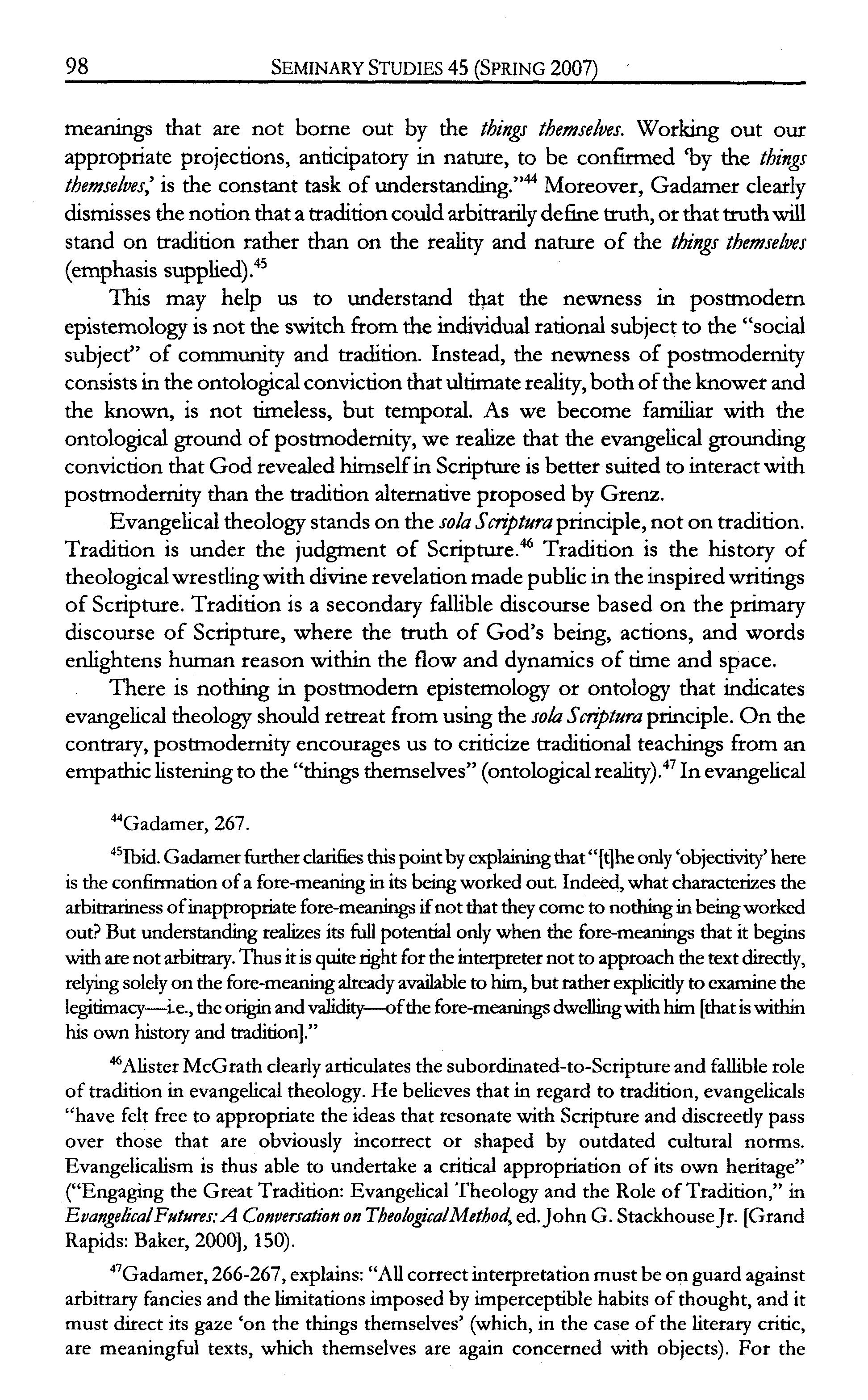
meanings that are not borne out by the things themselves. Working out our appropriate projections, anticipatory in nature, to be confirmed 'by the things themselves,' is the constant task of understanding."* Moreover, Gadamer clearly dismissesthenotionthatatraditioncouldarbitrarilydehnetruth, orthattruth d stand on tradition rather than on the reahty and nature of the things themselves (emphasissupplied).45
This may help us to understand &at the newness in postmodern epistemologyis not the switchfromthe individualrational subjectto the "social subjecty'of community and tradition. Instead, the newness of postmodernity consistsinthe ontologicalconvictionthatultimatereality,both oftheknower and the known, is not timeless, but temporal. As we become famrlrar with the ontologcalground of postmodernity,we rehe that the evangelicalgroundmg conviction that Godrevealedhimself in Scriptureis better suitedtointeractwith postmodernitythan the traditionalternativeproposed by Grenz.
Evangelicaltheology standsonthe solaScript~raprinciple,not on tradition. Tradtion is under the judgment of Script~re."~Tradition is the history of theologcalwresbgwith divinerevelationmadepublicintheinspiredwritings of Scripture.Traditionis a secondary falliblediscourse based on the primary discourse of Scripture, where the truth of God's being, actions, and words enlightens human reason within the flow and dynamics of time and space. There is nothing in postmodern epistemology or ontology that indicates evangelicaltheology shouldretreat fromusingthesohScriptmaprinciple.On the contrary,postmodernityencourages us to criticizetraditional teachmgs from an empathiclisteningtothe"hgs themselves" (ontologicalreality).47Inevangelical
451bid.Gadamerfurtherclat&es thispointby explainingthat"[tlhe only'objectivity' here istheconfirmationofa fore-meaninginitsbeingworkedout Indeed,what characterizesthe arbitrarinessofinappropriatefore-meaningsifnotthattheycometo nowinbeingworked out?But understanding realizesits fuU potential onlywhen the fore-meaningsthat it begins witharenotarbitrary.Thusitisquiteright fortheinterpreternotto approachthetextdirectly, relyingsolelyonthe fore-meaningalteadyavailabletohim,butratherexplicitlytoexaminethe legitimacy--i.e., theoriginandvalidity-f thefore-meaningsdwellrngwithhim [thatiswithin his own history and tradition]."
46AlisterMcGrath clearlyarticulatesthe subordinated-to-Scriptureand falliblerole of tradition in evangelical theology. He believesthat in regard to tradition, evangelicals "have felt free to appropriate the ideas that resonatewith Scripture and discreetly pass over those that are obviously incorrect or shaped by outdated cultural norms. Evangelicalismis thus able to undertake a critical appropriation of its own heritage" ("Engaging the Great Tradition: Evangelical Theology and the Role of Tradition," in Evange/ica/Futures:A Conversationon TbeolbgcalMetbod,ed.John G. StackhouseJr. [Grand Rapids: Baker, 20001, 150).
47Gadamer,266-267,explains:"Allcorrectinterpretation must be on guardagainst arbitrary fanciesand the limitationsimposed by imperceptiblehabits of thought, and it must duect its gaze 'on the things themselves' (which,in the case of the literary critic, are meaningful texts, which themselves are again concerned with objects). For the
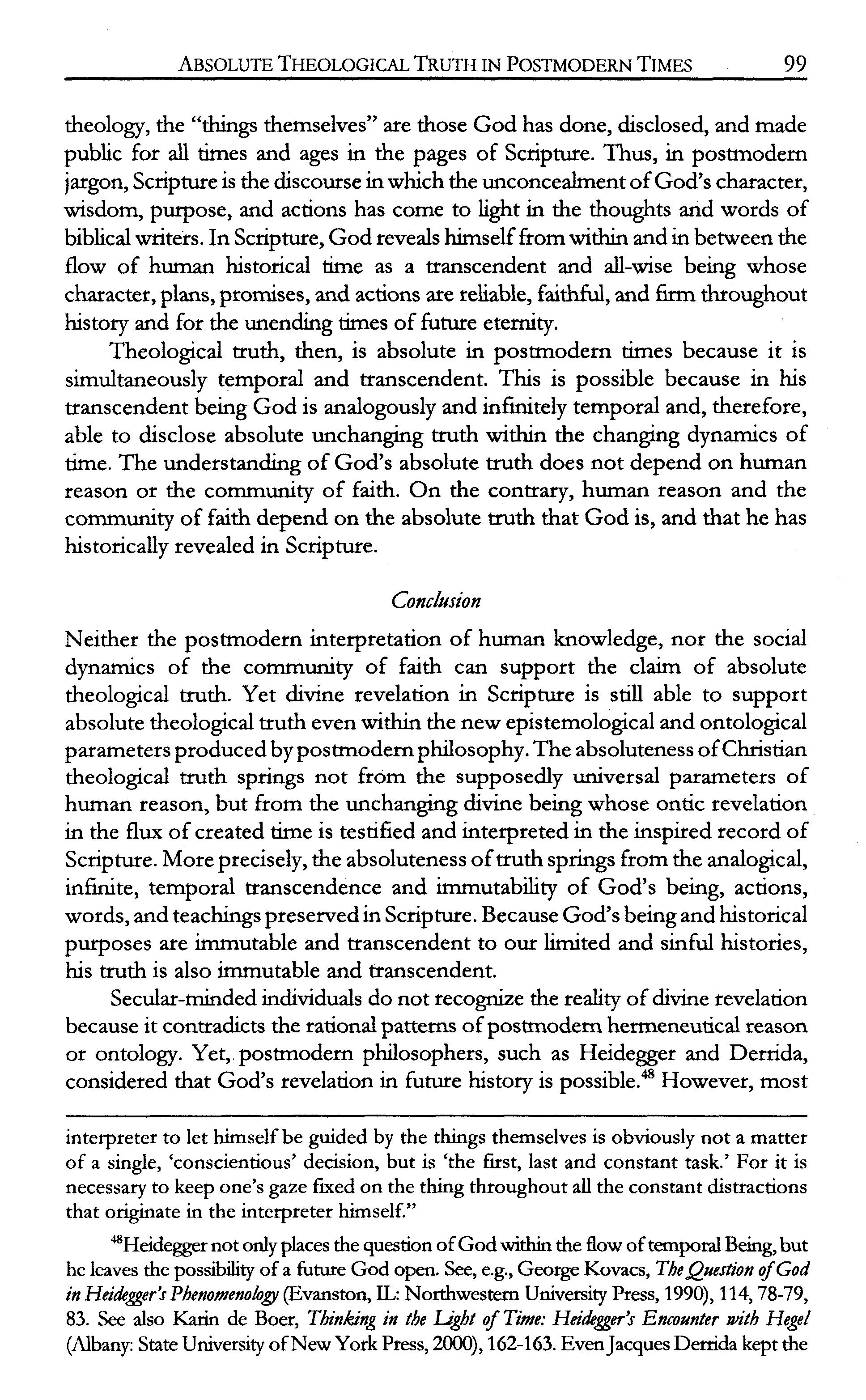
theology,the "things themselves" are those God has done, disclosed,and made public for all times and ages in the pages of Scripture.Thus, in postmodern jargon, Scriptureisthediscourseinwhichtheunconcealrnentof God's character, wisdom, purpose, and actions has come to light in the thoughts and words of biblicalwriters.InScripture,Godrevealshimself fromwithinandinbetween the flow of human hstorical time as a transcendent and all-wise being whose character,plans,promises,and actionsare reliable, faithful,and firmthroughout hstory and for the unendingtimes of future eternity.
Theologcal truth, then, is absolute in postmodern times because it is simultaneously temporal and transcendent. This is possible because in his transcendentbeing God is analogously and infinitelytemporal and, therefore, able to disclose absolute unchanging truth within the changmg dynamics of time.The understandingof God's absolute truth does not depend on human reason or the community of faith. On the contrary, human reason and the community of faith depend on the absolute truth that God is, and that he has hstorically revealedin Scripture.
Neither the postmodern interpretation of human knowledge, nor the social dynamics of the community of faith can support the claim of absolute theological truth. Yet divine revelation in Scripture is still able to support absolutetheologcal truth evenwith the new epistemologicaland ontological parametersproducedbypostmodem phdosophy.TheabsolutenessofChristian theological truth springs not from the supposedly universal parameters of human reason, but from the unchanging divine being whose ontic revelation in the flux of created time is testified and interpreted in the inspiredrecord of Scripture.Moreprecisely,the absolutenessoftruthspringsfromthe analogical, infulite, temporal transcendence and immutability of God's being, actions, words,andteachingspreservedinScripture.BecauseGod's beingandhistorical purposes are immutable and transcendent to our lunited and sinful histories, his truth is also immutable and transcendent.
Secular-mindedindmiduals do not recognizethe reahty of &vinerevelation becauseit contradrcts the rationalpatterns of postmodernherrneneutical reason or ontology. Yet, postmodern phdosophers, such as Heidegger and Derrida, consideredthat God's revelation in future history is possible.48However,most interpreter to let himself be guided by the things themselves is obviously not a matter of a single, 'conscientious' decision, but is 'the first, last and constant task.' For it is necessaryto keep one's gaze fmed on the thing throughout all the constant distractions that originate in the interpreter himself."
48HeideggernotonlyplacesthequestionofGodwithinthe flowoftemporalBeing,but he leavesthe possibilityof a futureGod open. See, e.g., GeorgeKovacs, TheQue~tionofGod inHeidegger?Pbenomenohg (Evanston,LL: NorthwesternUniversityPress, 1990),ll4,78-79, 83. See also Karin de Boer, Thinking in the Light 4Time:Hcdegger3 Encounter mth Hegel (Albany:StateUniversityofNewYorkPress,2000),162-163.EvenJacquesDerrida kept the
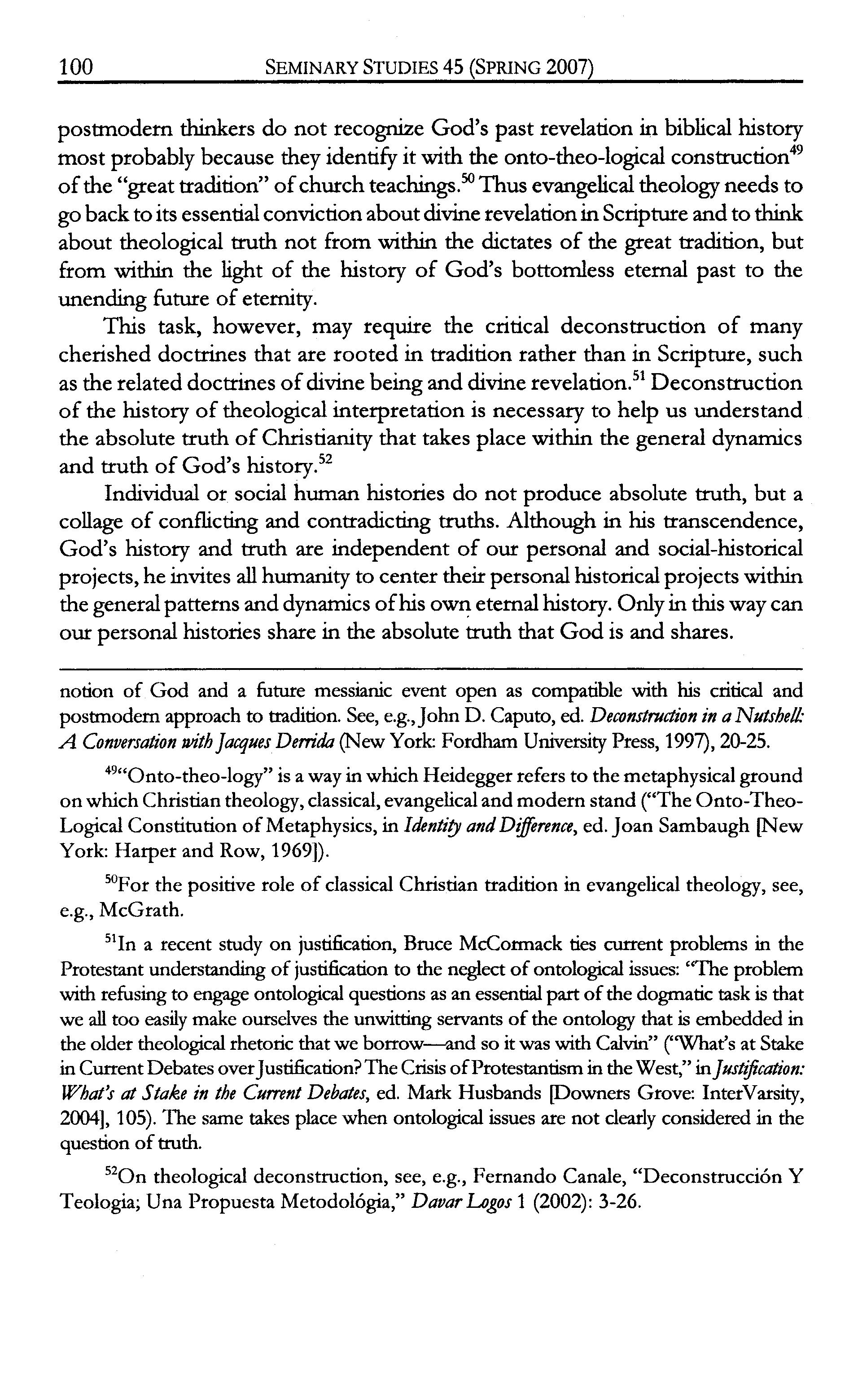
postmodern thinkers do not recognize God's past revelation in biblical hlstory most probably because they identifyit with the onto-theo-logicalcon~truction~~ of the "great tradition" ofchurchteachings50Thusevangelicaltheologyneedsto gobacktoitsessentialconvictionaboutdivinerevelationinScriptureandtothink about theological truth not from wih the Qctates of the great tradition, but from withrn the light of the history of God's bottomless eternal past to the unending future of eternity.
Ths task, however, may require the critical deconstruction of many cherished doctrines that are rooted in tradition rather than in Scripture,such asthe relateddoctrinesof Qvinebeinganddivinerevelation." Deconstruction of the hstory of theologcal interpretation is necessary to help us understand the absolute truth of Christianitythat takes placewih the general dynamics and truth of God's
Individual or social human histories do not produce absolute truth, but a collage of confhctingand contradictingtruths. Although in hs transcendence, God's htstory and truth are independent of our personal and social-historical projects,heinvitesallhumanityto centertheir personal hstoricalprojectswithin thegeneralpatternsanddynamicsofhis owneternalhistory.Onlyin thiswaycan our personalhistories share in the absolute truth that God is and shares.
notion of God and a future messianic event open as compatible with his critical and postmodem approach to tradition. See,e.g.,John D.Caputo,ed.Deconstn/ctionin aNutshe& A ConversationwithJacquesDemmah(New York:Fordharn UniversityPress, 1997),20-25.
49'cOnto-theo-logy"isaway in which Heideggerrefersto the metaphysicalground onwhich Christiantheology,classical,evangelicaland modern stand ("The Onto-TheoLogicalConstitution of Metaphysics,in Idntio andDzference,ed.Joan Sambaugh pew York: Harper and Row, 19691).
50Forthe positive role of classical Christian tradition in evangelical theology,see, e.g.,McGrath.
511na recent study on justification, Bruce McCormack ties current problems in the Protestantunderstanding of justification to the neglect of ontologicalissues: "The problem with refusingto engageontologicalquestionsas an essentialpart of the dogmatictask is that we all too easily make ourselvesthe unwitting servantsof the ontology that is embeddedin the older theologicalrhetoric thatwe borrow--and soitwas with Calvin" ("What's at Stake in CurrentDebatesoverJust%cation?TheCrisisofProtestantismintheWest," in]ust@cdion: What3 d Stake in the Current Deb- ed. Mark Husbands powners Grove: InterVarsity, 20041, 105).The same takes place when ontologicalissues are not dearly considered in the question of truth.
520ntheological deconstruction, see, e.g., Fernando Canale, ccDeconstrucci6nY Teologia; Una Propuesta Metodo16gia7"DavarLogos 1 (2002):3-26.